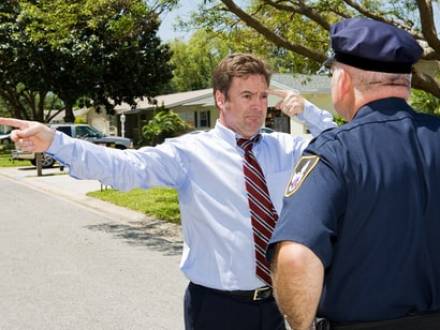Should You Agree to a Field Sobriety Test?
 The National Highway Traffic Safety Administration developed field sobriety tests almost fifty years ago. What began as 16 tests was later condensed to three tests. Field sobriety tests are considered "divided attention tests," which means the goal is to determine whether an impaired suspect has the mental and physical abilities required to drive a car.
The National Highway Traffic Safety Administration developed field sobriety tests almost fifty years ago. What began as 16 tests was later condensed to three tests. Field sobriety tests are considered "divided attention tests," which means the goal is to determine whether an impaired suspect has the mental and physical abilities required to drive a car.
While law enforcement officers will almost universally ask the driver to perform these field sobriety tests if they suspect impairment, there is no legal requirement in any state that requires compliance. Most people are unaware of this, so they do as the officer asks. Many problems are associated with the accuracy of field sobriety tests, the primary one being each officer’s training, consistency, and overall ability to accurately perform the tests.
If you are facing DUI charges, whether you refused field sobriety tests or agreed to them, it is important to speak to an experienced Towson, MD DUI attorney who can build a solid defense on your behalf.
What Are the Three Field Sobriety Tests?
The three field sobriety tests that are used today include:
- The One Leg Stand test requires a driver to stand on one leg for thirty seconds to test the ability to follow directions, as well as balance and coordination. Using arms to balance, swaying while balancing, hopping up and down, or putting a foot down means the driver who exhibits two of those fails the test.
- The Horizontal Gaze Nystagmus test is meant to show whether a driver exhibits "jerking" of the eyes caused by depressants like alcohol. The driver is asked to follow an object with his or her eyes to determine whether there is any jerkiness in the eyes.
- The Walk and Turn test measures a driver’s ability to maintain balance while following instructions given by the officer. Nine heel-to-toe steps are taken forward, then a turn, and nine steps back. A suspect who is unable to maintain his or her balance, misses the heel-to-toe, stops during the test, uses his or her arms for balance, or takes an incorrect number of steps fails the test.
When Are Field Sobriety Tests Administered?
A police officer must first have reasonable suspicion to believe a driver is impaired before pulling them over. This usually comes in the form of crossing the center line, driving extremely slow or exceedingly fast, or other traffic violations. Then, if the driver exhibits red, watery eyes or is slurring his or her words, there is probable cause to have the driver perform field sobriety tests. If the driver "fails" one or more of the tests, an arrest will be made. If the driver refuses the test, a portable breathalyzer test will be given, and an arrest will be made if the results are 0.08 or higher.
What Are Some of the Problems Associated with Field Sobriety Tests?
Field sobriety tests can be skewered when a woman is wearing heels on an uneven road, a subject is very nervous, or when the test is administered in the dark with only headlights for light. Elderly people typically do poorly on these tests because of declining balance and coordination. Individuals taking certain prescription drugs and those with illnesses or health conditions may not be able to pass a FST. In the end, these tests are extremely subjective and are only considered to be about 60-70 percent accurate under the best circumstances.
Contact a Baltimore County, MD DUI Lawyer
When facing DUI charges, the penalties can be severe, so it is always the best choice to call an experienced Towson, MD DUI attorney from Kirk Seaman, LLC. Attorney Seaman will aggressively defend your DUI charges and has good relationships with local judges and prosecutors, which benefits clients. The firm’s long history and reputation for integrity and sound results make it one of the best for help with a DUI. Call 410-837-6077 to schedule your free consultation.



